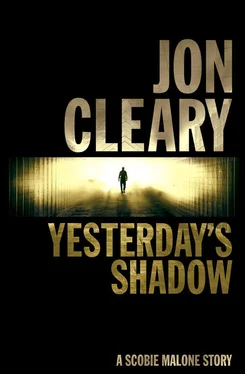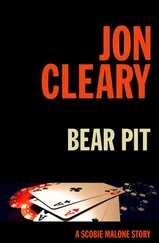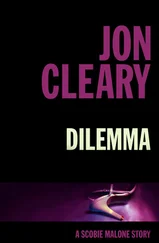1 ...7 8 9 11 12 13 ...16 ‘It’s your turf, Superintendent.’ Himes understood the term; he also obviously understood the territorial imperative. Malone abruptly remembered movies where American local officers resented the intrusion of the FBI. Himes might, just might, be easy to work with.
He was a thickset, black-haired man with a husky voice and eyes that once might have been fearless but had learned caution. ‘I’ll help all I can – when asked.’
‘Same here,’ said Bodine, the RSO. He looked as if, like Avery, he had been a football player; but not a quarterback, not by at least two halves. He was b-i-i-i-g; and fat. The diplomatic party circuit had got to him, his security was ungirdled. He had a voice that went with his build, like an internal landslide.
‘What’s the media situation?’ Kortright was a soft-featured man with thinning blond hair and an almost incongruously dark moustache, like a military character struggling to get out of an appeaser. His question had little bite to it.
‘So far,’ said Malone, ‘they only know Mrs Pavane under the name she registered at the hotel. Mrs Belinda Paterson.’
‘Who?’ Pavane was puzzled.
Malone looked at Random, who nodded; then he said to the Ambassador, ‘Mr Pavane, could I see you alone?’
Now there was puzzlement on the faces of Kortright and Bodine. Himes was blank-faced and Malone recognized a law officer who had been in a similar situation, telling secrets best left unrevealed.
Pavane looked at the Consul-General, who said, ‘Use Miz Caporetto’s office.’
Malone and the Ambassador went out and crossed to the press secretary’s office. Malone closed the door, turned to find the Ambassador had sat down heavily in one of the chairs in front of the desk. The coffee-pot was on the hot-plate, but this was no time for offering coffee. Something stronger might be better, but there was nothing in sight in the room. Malone sat down in the other chair and waited till the older man at last looked across at him.
‘Sorry, Inspector. I’m still coming to terms –’
Malone decided to ease his way into the situation: ‘Did your wife tell you where she was going in Sydney? Why she was up here?’
‘She was going shopping. And to the Art Gallery. She phoned me, but I was out and my secretary spoke to her –’
‘When was this?’
‘I think she said two-thirty. My wife said to tell me she’d be back on a later plane than the five o’clock one. That was all.’ He was looking at Malone, but his gaze was almost blank. ‘I just don’t understand –’ Then he made a helpless gesture with a big hand. ‘It’s just not like her –’
Malone said gently, ‘I’m afraid I’m going to tell you something that will further upset you. That’s why I asked could I see you alone –’
Pavane waited, a hand tightening on the arm of his chair.
Malone always hated this intrusion into another man or woman’s personal life: ‘There had been intercourse before your wife was murdered –’
The hand tightened even more: ‘She’d been raped?’
‘No, sir. The Medical Examiner said there was no evidence of that – rape always shows. Bruises, marks, things like that.’
The hand fell loose. ‘Jesus Christ, you know what you’re saying?’
Husband to husband, not cop to diplomat: ‘Yes, sir. And I hate telling you this. But it may be our only clue to who killed her. They are taking semen samples, there’ll be DNA tests when we have a suspect –’
Pavane waved a hand, not wanting to hear any more. He looked older, but age is a ghost that comes and goes till finally it settles. At last he said, ‘You know what you’re saying? You are accusing my wife –’
‘Sir, please –’ Malone held up his own hand. ‘I’m not accusing your wife of anything. I hate scandal and I’m not interested in it. All I want is to find out who killed her.’ He was about to add: and why. But now was not the moment.
Pavane sat silent and at last Malone said, ‘You were surprised when I said she was registered as Mrs Belinda Paterson. Was that her name before you were married?’
‘No.’
Again a long silence, then Malone said, ‘What was her name?’
A deep sigh; then Pavane’s gaze focused again. He frowned, drew in a deep breath: ‘Page, Wilhelmina Page. But she was always called Billie.’
‘You never heard her mention the name Paterson?’
‘Never.’
‘She had a credit card in that name.’
‘I never saw it. She had an American Express card as my wife, Mrs Billie Pavane, but I never checked her account. She was a good businesswoman, she was experienced.’
‘Tell me something about her.’ Still gently.
Pavane took his time, as if he had been asked to open a very personal diary. ‘We’ve been married two years – very happily married. My first wife died six years ago and I thought I’d never marry again. Then …’ He turned a direct gaze on Malone. ‘Are you married?’
‘Yes. Very happily. I have two daughters and a son, all grown.’
‘I have a son by my first marriage. He disappeared after his mother died. We never got on –’ He stopped. ‘Do you want to hear all this?’
‘I want to hear about your second wife. Had you known her long?’
‘No, not that long. She came to Kansas City – that’s my home town – about four years ago. She was a business consultant with our largest bank – handled public relations, things like that. I met her through politics – we were both raising funds for a local senator.’
‘You said she came to Kansas City – where did she come from? Her credit card gave an address in Oregon.’ He took out his notebook, checked. ‘Corvallis. Is it a big town? Was she a business consultant there?’
‘It’s not large. The State College is there. She was born there, her father worked for the college – not an academic, he was just some worker around the grounds.’
‘She went to college? Graduated there?’
‘No. Her parents were killed in an auto accident when she was – I’m a bit hazy here – seventeen or eighteen. She was an only child. She left Corvallis and went out to San Francisco. Look, why all the background?’
‘Mr Pavane, we’re puzzled why she booked into a hundred-dollar-a-night hotel, under an assumed name. I take it that isn’t the usual sort of hotel she’d stay at?’
‘No-o. I’m just as puzzled as you are. We’ve never been short of money. I’m comfortable –’ Meaning he was wealthy; or, in Australian terms, rich. ‘Billie liked the best – she was frank about that and I didn’t mind. My first wife was the same. Women are like that.’
He wasn’t entirely a diplomat: the three Malone women would have had reservations about him after that remark. But Malone was diplomatic: ‘Yes, I guess they are. Had your wife been married before? She was what – in her late thirties?’
‘Thirty-eight. No, she hadn’t been married. She’d had boyfriends, but she had never settled for a husband. She was too busy making her career, she said. I – well, I accepted that. I didn’t talk about my first wife and she didn’t talk about her ex-boyfriends. You’re a married man, you know how it is.’
Not yet: I haven’t been home so far. ‘You said you met in politics. Did she have political ambitions?’
‘No, not at all. Not as far as running for office. We were working together on last year’s presidential campaign – there were hints of an ambassadorship for me and that excited her. We thought of one of the smaller countries in Europe. Denmark, maybe – I’d been to Copenhagen when I was at university in England and I’d liked it. Then the President named Australia – he thought I had certain talents, connections, that would work out here.’
Читать дальше












